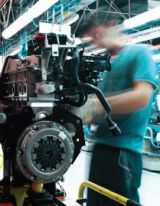On December 6, 2013 leading representatives of innovative private sector employers, academics, and senior US and European government officials met at the Atlantic Council to discuss workforce development and skills training. The meeting took place as the Council launched a new report, entitled “Training Our Future: Skilled Workers and the Revival of American Manufacturing,” which aims to inspire a new policy debate in the United States focused on talent and employment issues to ensure the country fully takes advantage of its energy revolution and a growing global marketplace.
This report marks an important new chapter in the Council’s work on global competitiveness issues. At a time when the US has access to almost limitless new energy supplies, and an abundance of underutilized talent after the financial crisis , only a significant skills gap stands in the way of the US fully capitalizing on this opportunity. The US can best lead the world toward open markets and democratic systems only if its own economy is strong bolstered by a robust, thriving workforce.
Despite elevated unemployment numbers, a large number of jobs are currently available across the United States. It is vital that the government and private sector work together to reform education and workforce development programs to ensure workers have the skills needed to succeed in the jobs of today and tomorrow. Developing a skilled workforce is a monumental task that demands that we rethink our notions about the roles of government and the private sector in training workers.
At Friday’s meeting, many solutions were discussed for addressing the skills gap. Some experts favor a retooling of the US community college system to better reflect the needs of employers, while others emphasized the need for better apprenticeship programs like those found in Germany and other parts of Europe. Other options include legislation which would promote accreditation and qualification portability nationwide, as well as expanding state-level programs that have proven effective in increasing worker readiness.
